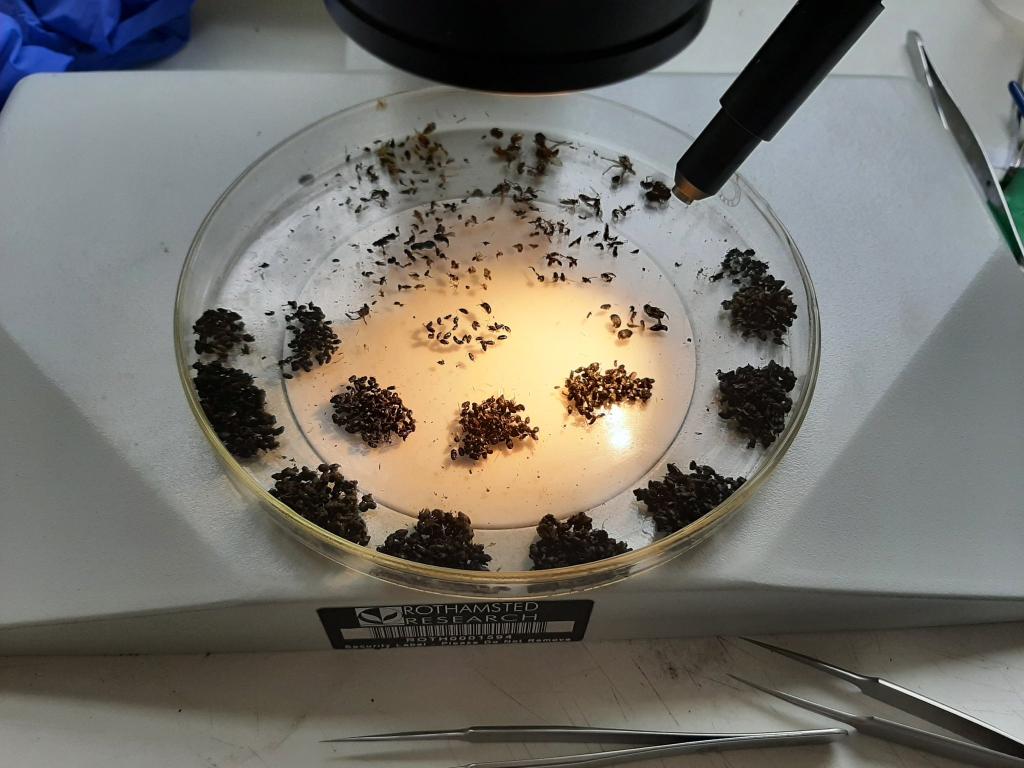The big picture: using wildflower strips for pest control
A new study comparing small balls of food fed by adult swifts to their offspring with trap data from the Rothamsted Insect Survey, suggests that the birds could make a useful contribution to pest suppression – particularly if their numbers could be increased.
The balls of food (boluses) were analysed to work out what insects they contained and found to have a high preponderance of agriculturally important species, including pollen beetles and cabbage stem flea beetles. These specimens were compared to the numbers sampled on the same day in the nearest Rothamsted suction trap (part of the UK National Insect Survey). These beetle species are also larger than other species sampled in the area on that day.
Food boluses are small ball-like structures containing the insect prey that are regurgitated to nestlings. Boluses from adult swifts provisioning their nestlings were collected during annual ringing by birding experts at a breeding colony in Suffolk. These were taxonomically identified and compared to corresponding daily insect catches from a nearby Rothamsted Insect Survey suction trap operating within the foraging area of common swifts.

These findings suggest that the birds are actively seeking out larger species of insects, probably to maximise their food foraging returns. Conversely, smaller pest species like aphids and thrips were not as frequent in the bolus samples as in the traps.
“We have long known that birds like swifts consume large quantities of insects,” said Hannah Romanowski who led the research. “What this study suggests for the first time is that, compared to randomly trapped specimens, they are selectively feeding on larger crop pests. This suggests that they could be immensely valuable as part of a more ecologically focussed pest control strategy.”
The common swift has experienced significant declines in the UK since the 1990s and reductions in the availability of prey during their summer breeding season in the UK are likely to be a key factor in this.
“These results suggest that far more attention should be given to conservation measures designed to encourage swifts in agricultural landscapes” says Romanowski. “The farm where we did the study is specifically managed with a ‘for nature' philosophy, so attracts a healthy population of birds like swifts. Hopefully there will be a wider uptake of these approaches in future allowing us to collect much more data on how carefully considered on-farm wildlife management can make a significant contribution to crop protection.”

APPLIED ENTOMOLOGIST
Rothamsted Research is the longest-running agricultural research institute in the world. We work from gene to field with a proud history of ground-breaking
discoveries in areas as diverse as crop management, statistical interpretation and soil health. Our founders, in 1843, were the pioneers of modern
agriculture, and we are known for our imaginative science and our collaborative approach to developing innovative farm practice.
Through independent research, we make significant contributions to improving agri-food systems in the UK and internationally, with
economic impact estimated to exceed £3 bn in annual contribution to the UK economy. Our strength lies in our systems approach, which combines strategic research,
interdisciplinary teams and multiple partnerships.
Rothamsted is home to three unique National Bioscience Research Infrastructures which are open to researchers from all over the world:
The Long-Term Experiments,
Rothamsted Insect Survey and the
North Wyke Farm Platform.
We are strategically funded by the Biotechnology and Biological Sciences Research Council (BBSRC), with additional support from other national and
international funding streams, and from industry. We are also supported by the Lawes Agricultural Trust (LAT).
The Biotechnology and Biological Sciences Research Council is part of UK Research and Innovation, a non-departmental public body funded by a grant-in-aid
from the UK government.
BBSRC invests to push back the frontiers of biology and deliver a healthy, prosperous and sustainable future. Through our investments, we build and support a vibrant,
dynamic and inclusive community which delivers ground-breaking discoveries and develops bio-based solutions that contribute to tackling global challenges,
such as sustainable food production, climate change, and healthy ageing.
As part of UK Research and Innovation (UKRI), we not only play a pivotal role in fostering connections that enable the UK’s world-class research and innovation system
to flourish – we also have a responsibility to enable the creation of a research culture that is diverse, resilient, and engaged.
BBSRC proudly forges interdisciplinary collaborations where excellent bioscience has a fundamental role. We pioneer approaches that enhance the equality, diversity,
and inclusion of talent by investing in people, infrastructure, technologies, and partnerships on a global scale.
The Lawes Agricultural Trust, established in 1889 by Sir John Bennet Lawes, supports Rothamsted Research’s national and international agricultural science through the provision of land, facilities and funding. LAT, a charitable trust, owns the estates at Harpenden and Broom's Barn, including many of the buildings used by Rothamsted Research. LAT provides an annual research grant to the Director, accommodation for nearly 200 people, and support for fellowships for young scientists from developing countries. LAT also makes capital grants to help modernise facilities at Rothamsted, or invests in new buildings.